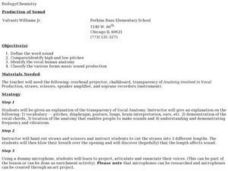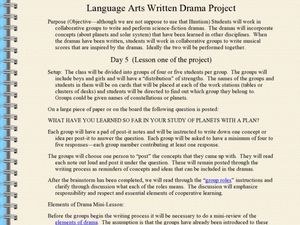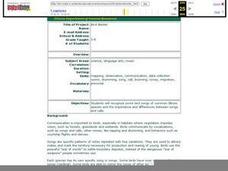Curated OER
Name That Tune: Matching Musical Tones Through Waveform Analysis
Pupils detect the waveform of musical notes to determine the code for the "safe" in this forensics simulation lesson plan. They use a microphone and tuning forks along with Vernier EasyData on their graphing calculator to analyze five...
PBS
Reading Adventure Pack: Rivers
A Reading Adventure Pack showcases a fiction and nonfiction book followed by a series of hands-on activities. First, learners widdle sticks to build a tiny raft, conduct sensory experiments, and create a rap or folk song about rivers and...
Perkins School for the Blind
Learning to Identify Sounds Made by the Body
Sneeze, snap, tap, and whistle; Did I do that? Explore the parts and sounds of the human body with your learners with visual impairments. First you'll name the parts of the body, make a sound with each part, and then have the class...
Curated OER
Solar System Planet Research
In this space science activity, students collect data that includes information in a chart or graph to display in a group. They identify and describe various planet features of a specific planet of choice. Students write notes and the...
Curated OER
Matter Unit
Students create products from studying about matter that include: Make a "T" chart with matter and non matter items. Write a poem, song, or rap about matter. Five vocabulary words from the chapter must be included in the poem.
Curated OER
Vocal Exploration
Students explore vocal anatomy. In this biology/music instructional activity, students first learn vocabulary associated with the voice and body. They then use straws, microphones and recorders to differentiate between high and low...
Curated OER
Dirt Cups
After a hard day examining and dissecting worms, why not put your feet up and snack on a few? Here is a really cute idea that can be used to celebrate Earth Day or to accent a thematic learning experience. Kids use clay pots, gummy...
Curated OER
Pollution is Not a Solution
Young scholars explore the environment by completing science worksheets in class. In this water conservation lesson, students identify ways water is used in our society and how we abuse the privilege. Young scholars discuss methods to...
Curated OER
Machines All Around Us
Students identify simple machines. In this physics lesson, students explore different rooms in the school building, looking for simple machines. Students use a digital camera to take pictures of the simple machines.
Curated OER
Life Science: Exploring Our Human Bodies
Students explore the concept of the human body. They complete a variety of activities concerning the function of various organs. They listen to their heartbeat with a stethoscope, examine how muscles work during a game of tag, and play...
Curated OER
What's "Out" There?
First graders investigate the five outer planets. In this space science activity, 1st graders read the book Our Solar System and identify the five outer planets. Students create a booklet and write about outer planets.
Curated OER
Cell Division: The Cell Cycle and Mitosis
Students will be able to identify the different stages of the eukaryotic cell cycle as well as the different stages of mitosis in the proper order. Students will also be able to recognize what organelles of the cell are integral to...
Curated OER
Language Arts Written Drama Project: Creationism
Learners create and perform science fiction drams based upon their knowledge of the solar system. In this solar system lesson students work in cooperative groups to create a short play and will also score the play.
Curated OER
Hypothesis Testing: Top Ten Singles
Students review and better examine hypothesis testing and evaluation of probability distributions. the use of the discovery method is vital to the studying because it is about student interests which helps for motivation.
Curated OER
Bird Banter
Learners listen to examples of common bird songs of birds found in Illinois. As a class, they discover the importance between the differences in songs and calls. They practice making their own bird calls and songs to end the lesson plan.














